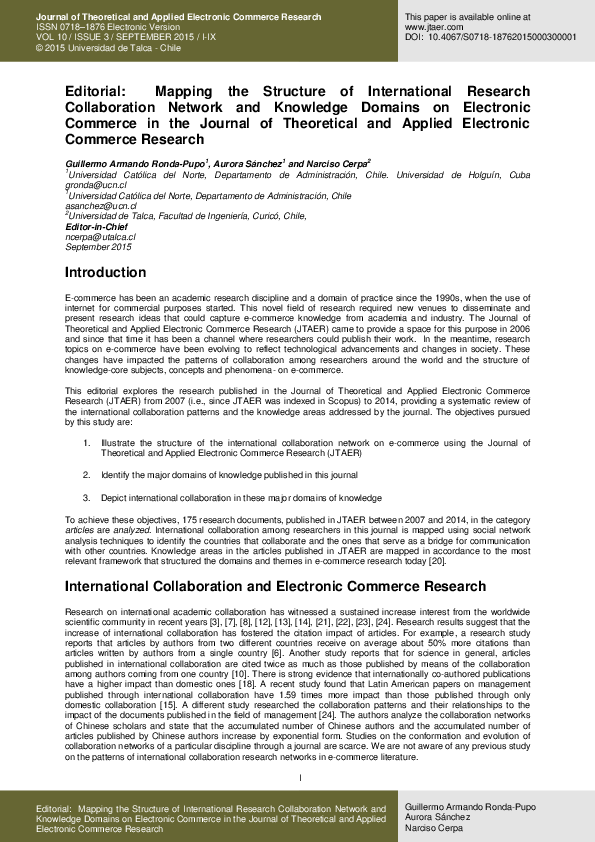Exploring Tourists’ Behavioral Patterns in Bali’s Top-Rated Destinations: Perception and Mobility
IF 5.1
3区 管理学
Q1 BUSINESS
Journal of Theoretical and Applied Electronic Commerce Research
Pub Date : 2024-04-01
DOI:10.3390/jtaer19020040
引用次数: 0
Abstract
The tourism sector plays a crucial role in the global economy, encompassing both physical infrastructure and cultural engagement. Indonesia has a wide range of attractions and has experienced remarkable growth, with Bali as a notable example of this. With the rapid advancements in technology, travelers now have the freedom to explore independently, while online travel agencies (OTAs) serve as important resources. Reviews from tourists significantly impact the service quality and perception of destinations, and text mining is a valuable tool for extracting insights from unstructured review data. This research integrates multiclass text classification and a network analysis to uncover tourists’ behavioral patterns through their perceptions and movement. This study innovates beyond conventional sentiment and cognitive image analysis to the tourists’ perceptions of cognitive dimensions and explores the sentiment correlation between different cognitive dimensions. We find that destinations generally receive positive feedback, with 80.36% positive reviews, with natural attractions being the most positive aspect while infrastructure is the least positive aspect. We highlight that qualitative experiences do not always align with quantitative cost-effectiveness evaluations. Through a network analysis, we identify patterns in tourist mobility, highlighting three clusters of attractions that cater to diverse preferences. This research underscores the need for tourism destinations to strategically adapt to tourists’ varied expectations, enhancing their appeal and aligning their services with preferences to elevate destination competitiveness and increase tourist satisfaction.探索游客在巴厘岛顶级目的地的行为模式:认知与流动
旅游业在全球经济中发挥着至关重要的作用,既包括物质基础设施,也包括文化参与。印尼的旅游景点种类繁多,发展势头迅猛,巴厘岛就是一个显著的例子。随着技术的飞速发展,游客现在可以自由地进行独立探索,而在线旅行社(OTA)则是重要的资源。游客的评论极大地影响了目的地的服务质量和认知度,而文本挖掘则是从非结构化评论数据中提取洞察力的重要工具。本研究整合了多类文本分类和网络分析,通过游客的感知和动向揭示游客的行为模式。本研究超越了传统的情感和认知图像分析,对游客的认知维度进行了创新,并探索了不同认知维度之间的情感相关性。我们发现,旅游目的地普遍获得积极反馈,好评率高达 80.36%,其中自然景点的好评率最高,而基础设施的好评率最低。我们强调,定性的体验并不总是与定量的成本效益评估相一致。通过网络分析,我们确定了游客流动的模式,突出了迎合不同偏好的三个景点集群。这项研究强调,旅游目的地需要在战略上适应游客的不同期望,增强吸引力,使其服务符合游客的偏好,从而提升目的地的竞争力,提高游客的满意度。
本文章由计算机程序翻译,如有差异,请以英文原文为准。
求助全文
约1分钟内获得全文
求助全文
来源期刊
CiteScore
9.50
自引率
3.60%
发文量
67
期刊介绍:
The Journal of Theoretical and Applied Electronic Commerce Research (JTAER) has been created to allow researchers, academicians and other professionals an agile and flexible channel of communication in which to share and debate new ideas and emerging technologies concerned with this rapidly evolving field. Business practices, social, cultural and legal concerns, personal privacy and security, communications technologies, mobile connectivity are among the important elements of electronic commerce and are becoming ever more relevant in everyday life. JTAER will assist in extending and improving the use of electronic commerce for the benefit of our society.

 求助内容:
求助内容: 应助结果提醒方式:
应助结果提醒方式:


